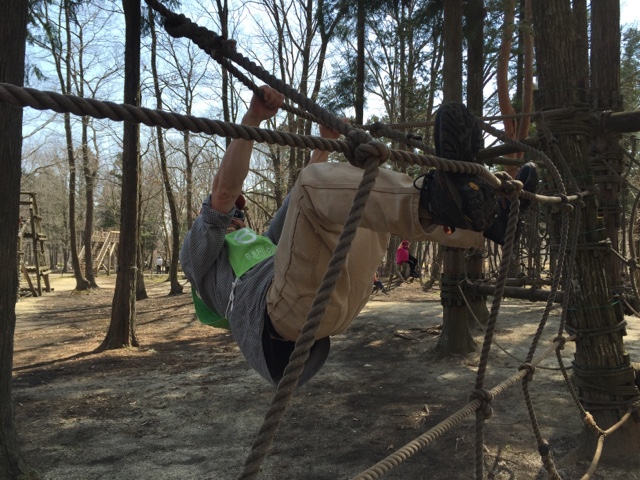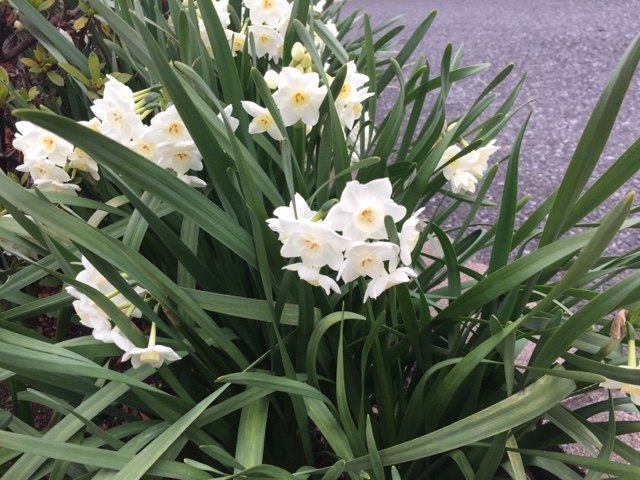Five years ago this month our lives had been shaken up, literally. The below blog post was written ten days after the earthquake/tsunami.
At the time I was newly appointed as the (temporary) managing editor of the next issue of the magazine, designated as a "disaster edition". School was still out: unreliable trains, plus many families who evacuated due to the uncertainty of the nuclear situation made it impossible to hold meaningful classes. So we all were at home. The boys were supposed to do some kind of homeschooling and David was doing online assistance for his own students. It wasn't easy.
 |
Packing the "disaster" edition to post out.
We did a record run that issue, printing
more than 3 ½ times our usual run, and we
sold out. I don't even have a copy in Japan
of that issue any more. We could have printed
many more. |
It's good to look back and remember. God sustained us through all this. Now we can see that through this disaster he's opened doors to ministry in this area. I know, we've just sent a 40-page issue of the magazine to the printer that focuses on where we are five years later.
Have a read about our day, the 21st of March, 2011:
Our new normal day
We're coming to the end of another day. A day of juggling three boys, pseudo-homeschooling, two computers and two part-time jobs. A grey, rainy, chilly day. Another day where we had very little framework to hang our day on. I guess that has been a constant of the last ten days. Almost nothing in fixed in our diaries, and yet things that needed getting done. Something like summer holidays, except a feeling like we should be accomplishing things.
I write "pseudo-homeschooling" because for the most part it is only an attempt at home schooling. We don't have a curriculum. We have few things that really need doing. It is more like filling the days with educational-value activities, than a real attempt at schooling. The trickiest part is juggling computer usage. Many of the suggested activities involve computers attached to the internet, and with only two computers with that capability it truly can be a juggle with five people in the house. (Not to say that we aren't thankful for the blessing of actually having two computers.)
My job as household manager remains. So sourcing groceries, previously known as grocery shopping, remains. 'Sourcing' giving the impression that groceries that you are looking for are not necessarily in the places you think they'll be or in the first place you look. After yesterday's encounter with a petrol-station line, we're even more reluctant to use our car. Stories of people waiting 2 hours for 10 litres of petrol are pretty common, even here in Tokyo. For now we'll keep our car with its 3/4 full tank for emergencies only. So, that meant grocery shopping in the cold rain in full rain pants and jacket on my bike. Thankfully it wasn't too bad I didn't use gloves and my fingers didn't freeze off, but on this public holiday (Spring Equinox holiday) there were very few others out on their bikes.
So, it really is a "new normal" that we are operating under. Grocery shops are not back to normal. I haven't been able to find bread flour yet. Milk, bread and noodles are still in short supply. There remain conspicuous gaps on shelves. People don't seem to be panic buying, but perhaps it is the lack of fuel that is causing difficulties with delivery vehicles?
Today, with an assurance of almost no chance of a power outage, I've finally been able to use my slow cooker to cook up the very unusual spare ribs that I found before this all happened. I've never seen them before in Japan, so it will be a nice treat.
I haven't yet taken up the cleaning challenge that is building around me. The dust bunnies in the corners just haven't seemed all that important in comparison to all the other things going on recently. I guess I've got it coming. I'm dropping strong hints to the boys who merely raise their eyebrows or roll their eyes.
The school had various "open" things going for the morning, but that still required a parent for supervision. David ended up taking them and toting his computer along, trying to fit in some curriculum planning (or other science department stuff that I don't understand) along the way.
I stayed home and got my three articles for our mission's international magazine finished. That is the first piece of on-demand journalism I've ever done. Must say I don't think I'm cut out for fast paced journalism! But it was nice to get that done, even if I felt as though there was so much more that I could have said, unfortunately with the deadline and word limit, I just couldn't.
Then I've continued making connections, sourcing stories and networking. I went into the CRASH command centre mid afternoon to have a meeting about the upcoming edition of Japan Harvest. I'm somewhat relieved as some of the responsibilities for the edition have been taken off my shoulders, but we're aiming even higher and wider now in quality and purpose, so in some ways I'm not totally relieved. There is a lot to be done in four weeks - our tentative "send-to-the-printer" date. I still feel a little bit like I'm a sixth grader doing university-level work. However I'm gradually making progress and have found another editor to help with the stories that I'm finding.
We received a phone call from our mission's home office, just checking that we were okay. It is great to feel cared for. That has been a real sense we've had from this whole affair - that people back home do care for us. Even in normal times we send lots of information back in the form of prayer/news letters, but because life is busy we often hear very little back, that is generally okay, but sometimes discouraging. It has been very encouraging to hear from so many who regularly read our news and pray.
I was encouraged to hear people at CRASH command centre talking about taking a day-off. We mostly took yesterday as our day-off. I still checked email, but didn't really pro-actively work. Today I feel somewhat refreshed. However people at the command centre are working about 11 hours a day, 6 1/2 days a week. It is a very busy, intense and frequently changing workplace. They are working hard to get things set-up and with so many people in need, I can understand the urgency. We also fear for people's ability to keep this pace up.
Well this has been a rambling kind-of post, thanks for sticking around. I hope I've given you some insight into our somewhat unusual days.
Before I sign-off I want to remind you of those in Japan who have greater needs than ours. That there remains, according to a report I read this afternoon, something like 2.3 million Japanese without running water. Many are able to access water via a community tap (like a village well), but not where they are residing.











































